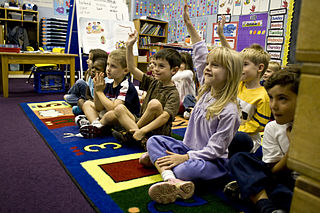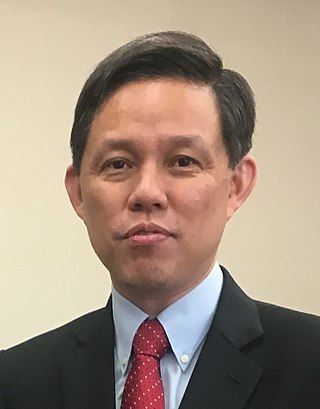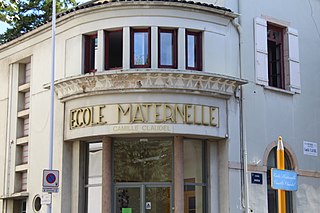A preschool, also known as a kindergarten or child care centre in Singapore, [1] is an educational establishment or learning space offering early childhood education to children before they begin compulsory education at primary school. All Singapore citizens born after 1 January 1996 and living in Singapore must attend a national primary school unless an exemption is granted.
A preschool may be publicly or privately operated, and may be subsidized from public funds such as The Baby Bonus Fund. [2] [3]
All Preschools in Singapore are required to obtain license under the Early Childhood Development Centres Act 2017. [4]
The Early Childhood Development Agency (ECDA), an autonomous agency jointly overseen by the Ministry of Education (MOE) and the Ministry of Social and Family Development (MSF), and hosted under the Ministry of Social and Family Development, serves as the regulatory and developmental authority for the early childhood sector in Singapore, overseeing key aspects of children's development below the age of 7, across both kindergartens and child care centres. [5]
If a Child Care Centre is licensed by ECDA, or Kindergarten that is registered with ECDA/Committee for Private Education (CPE), it is considered as an Approved Institution (AI) under the Baby Bonus Scheme. [6]
List of AI can be found on Singapore government website. [7]
Singaporean with Child Development Account (CDA) set up will be able to use the First Step grant ($3,000) to pay for educational and healthcare expenses of all their children immediately. [8]
If a child is a Singapore Citizen and is enrolled in an ECDA-licensed infant care/ child care centre in Singapore, he/she qualifies for Basic Subsidy. If the mother is a working mum (working at least 56 hours per month), the amount is S$600 (Infant Care) and S$300 (Child Care). If the mother is not working (working less than 56 hours per month), the amount is S$150 (Infant Care) and S$150 (Child Care). [9]
In addition to Basic Subsidy, a working mum with Singaporean child enrolled in ECDA-licensed centres will qualify for up to S$440 Additional Subsidy, [10] if their total gross monthly income (including bonuses, commissions, overtime pay, allowances and before CPF deduction) earned by mum and her spouse is less than S$7,500 per month. The income of family members included in the application will also be factored into the total gross monthly income if applying through Per Capita Income. [9]
At the National Day Rally on Sunday (18 August 2019), Prime Minister Lee Hsien Loong said that the authorities would raise the income ceiling from S$7,500 to S$12,000 for families seeking to qualify for more preschool subsidies in year 2020. [10]
Preschool teachers in Singapore need to equip themselves with relevant certification from the National Institute of Early Childhood Development (NIEC) or WSQ certification in order to qualify as a full-fledged preschool professional. [11] [12]
There are 3 types of childcare centres in Singapore: Premium, Anchor Operators and Partner Operators.
Premium operators are private-run childcare centres. These childcare centres do not receive government funding, thus they tend to have more expensive school fees of about $1,000 to $2,000 a month. [13]
Typically, premium childcare centres have their own curriculum and pedagogy. Some examples include Mindchamps, White Lodge, EtonHouse and Primus Schoolhouse.
Anchor operators are private-run childcare centres. This makes them similar to premium childcare centres. The main difference is that anchor operators receive funding support from government to keep its monthly fees at a cap of $720, $1,275 and $160 (excluding GST) for full-day child care, full-day infant care and kindergarten respectively. They are funded by the Anchor Operator Scheme (AOP). [14]
In 2014, five AOPs were selected and received funding support till 2018, which was then extended to 2022. [14] In 2023, Ministry of Social and Family Development announced that the scheme will be extended to more operators, with more details to be announced in Q2 2023. [15]
Since January 2023, children from lower-income families are prioritised for enrolment into AOPs. This applies to children from families with a gross monthly household income of up to S$6,000. In addition, children from families with a gross monthly household income of up to S$3,000 will be given higher priority.
In 2023, there are about 600 AOP preschool centres. [16]
Partner operators function in the same manner as anchor operators. For partner operators, they receive funding under The Partner Operator Scheme (POP). To qualify for the POP scheme, childcare centres must have a minimum size of 300 child care places. [17] This is to encourage economies of scale and career progression for teachers. Partner Operators monthly cap is of $800 and $1,400 (excluding GST) for full-day child care and infant care programme respectively, $600 and $1,000 for half-day child care and infant care programme respectively for Singapore Citizen children. [17]
They receive funding support from Year 2016 – 2020. As of 2020, there are 22 partner operators in Singapore. The full list of POPs can be found on ECDA website. [18]
Childcare (also known as daycare) centres provide child care services and preschool developmental programmes for children aged from 18 months to children below 7 years old. Several centres also provide infant care programmes for infants aged from 2 to 18 months old. [11] [19] Childcare centres provide full-day and half-day care programmes to children below the age of seven, in addition to education programmes. [20]
Kindergartens provide preschool developmental programmes for children aged about 2 years to children below 7 years of age. The programmes comprise at least Kindergarten 1 and Kindergarten 2. In addition, kindergartens may also provide programmes for Playgroup, Pre-Nursery (or Nursery 1), and Nursery (or Nursery 2) five days a week. Most kindergarten sessions range between 2 and 3 hours for Playgroup and Pre-Nursery, and between 3 and 4 hours for Nursery and Kindergartens 1 & 2. [11] [21] [22]
There are currently 50 MOE Kindergaretens across Singapore, with a total of 60 more kindergartens to be opened by 2027. [23] Top priority for admissions go to Singaporean children from lower-income households living within 1 km of the MOE kindergarten. [24]

Kindergarten is a preschool educational approach based on playing, singing, practical activities such as drawing, and social interaction as part of the transition from home to school. Such institutions were originally made in the late 18th century in Germany, Bavaria and Alsace to serve children whose parents both worked outside home. The term was coined by German pedagogue Friedrich Fröbel, whose approach globally influenced early-years education. Today, the term is used in many countries to describe a variety of educational institutions and learning spaces for children ranging from two to six years of age, based on a variety of teaching methods.

Child care, otherwise known as day care, is the care and supervision of a child or multiple children at a time, whose ages range from two weeks of age to 18 years. Although most parents spend a significant amount of time caring for their child(ren), child care typically refers to the care provided by caregivers that are not the child's parents. Child care is a broad topic that covers a wide spectrum of professionals, institutions, contexts, activities, and social and cultural conventions. Early child care is an equally important and often overlooked component of child's developments.

A preschool, also known as nursery school, pre-primary school, play school or creche, is an educational establishment or learning space offering early childhood education to children before they begin compulsory education at primary school. It may be publicly or privately operated, and may be subsidized from public funds.

Education in Singapore is managed by the Ministry of Education (MOE). It controls the development and administration of state schools receiving taxpayers' funding, but also has an advisory and supervisory role in respect of private schools. For both private and state schools, there are variations in the extent of autonomy in their curriculum, scope of taxpayers' aid and funding, tuition burden on the students, and admission policy.
The Early Childhood Education Act is the name of various landmark laws passed by the United States Congress outlining federal programs and funding for childhood education from pre-school through kindergarten. The first such act was introduced in the United States House of Representatives by Congresswoman Patsy Mink of Hawaiʻi in the 1960s. The theory behind the act is that the years before a child reaches kindergarten are the most critical to influence learning. Many children do not have access to early education before entering kindergarten. The goal of the act is to provide a comprehensive set of services for children from birth until they enter kindergarten.
The following outline is provided as an overview of and topical guide to childhood:

Pre-kindergarten is a voluntary classroom-based preschool program for children below the age of five in the United States, Canada, Turkey and Greece. It may be delivered through a preschool or within a reception year in elementary school. Pre-kindergartens play an important role in early childhood education. They have existed in the US since 1922, normally run by private organizations. The U.S. Head Start program, the country's first federally funded pre-kindergarten program, was founded in 1967. This attempts to prepare children to succeed in school.
A preschool teacher is a person who is employed to care for children from infant to 4 years of age in a daytime setting. “Preschool“ is the category for children aged 2 to 4 years of age..
Child and family services (CFS) is a government or non-profit organisation designed to better the well being of individuals who come from unfortunate situations, environmental or biological. People who seek or are sought after to participate in these homes have no other resource to turn to. Children might come from abusive or neglectful homes, or live in very poor and dangerous communities. There are also agencies that cater to people who have biological deficiencies. Families that are trying to live in stable lives come to non-profit organisations for hope of a better future. Child and family services cater to many different types of people who are all in different situations. These services might be mandated through the courts via a governmental child protection agency or they might be voluntary. Child and family services may be mandated if:

Chan Chun Sing is a Singaporean politician and former major-general who has been serving as Minister for Education since 2021 and Minister-in-charge of Public Service since 2018. A member of the governing People's Action Party (PAP), he has been the Member of Parliament (MP) representing the Buona Vista division of Tanjong Pagar GRC since 2011.

The AMP Singapore, formerly known as the Association of Muslim Professionals, is a non-profit organisation serving the Muslim community in Singapore. AMP is a registered charitable organisation and is accorded the status of an Institution of Public Character.

PAP Community Foundation is a charitable foundation in Singapore founded by the governing People's Action Party (PAP). Its aim includes the social and charitable causes between Singaporeans and the PAP, especially in preschool education, eldercare and community services. It also includes offering financial assistance and promoting welfare of its citizens. Since 1986, the foundation has built many kindergartens and centres islandwide providing childcare, student care and aged care services. Centres are also built close to public housing estates, such that the centres are all within a close proximity. The incumbent Council Chairwoman is Minister for Communications and Information, Josephine Teo.

Rosalie Community Kindergarten and Preschool is a heritage-listed kindergarten at 57 Elizabeth Street, Paddington, City of Brisbane, Queensland, Australia. It was designed by Arnold Edward Brooks and built in 1935 by Ralph Alexander Lind. It is also known as Rosalie Kindergarten and The Little Citizens Free Kindergarten. It was added to the Queensland Heritage Register on 27 September 2002.

Helen May is a New Zealand education pioneer. She has been an eloquent activist and academic in education, with a strong feminist focus on early childhood education. Her advocacy has been characterised by its focus on the rights and needs of children and teachers, expressed by an active and collaborative engagement with educational institutions, trade unions, the Ministry of Education and other government agencies.

Educational management refers to the administration of the education system in which a group combines human and material resources to supervise, plan, strategise, and implement structures to execute an education system. Education is the equipping of knowledge, skills, values, beliefs, habits, and attitudes with learning experiences. The education system is an ecosystem of professionals in educational institutions, such as government ministries, unions, statutory boards, agencies, and schools. The education system consists of political heads, principals, teaching staff, non-teaching staff, administrative personnel and other educational professionals working together to enrich and enhance. At all levels of the educational ecosystem, management is required; management involves the planning, organising, implementation, review, evaluation, and integration of an institution.
Margaret R. Burchinal is a quantitative psychologist and statistician known for her research on child care. She is senior research scientist and director of the Data Management and Analysis Center of the Frank Porter Graham Child Development Institute of the University of North Carolina at Chapel Hill.

The Early Childhood Development Agency is an autonomous government agency of the Ministry of Social and Family Development (MSF) that manages the early childhood education sector such as overseeing the development of childcare centres and kindergartens in Singapore. The agency is jointly overseen by the Ministry of Social and Family Development (MSF) and Ministry of Education (MOE).
Early childhood education in the United States relates to the teaching of children from birth up to the age of eight. The education services are delivered via preschools and kindergartens.
MindChamps is an early childhood educator headquartered in Singapore. It is the first early childhood educator to list on the Singapore Exchange (SGX).

In France, nursery school accommodates children aged 3 to 5, and some schools will accept students as young as 2 years old.